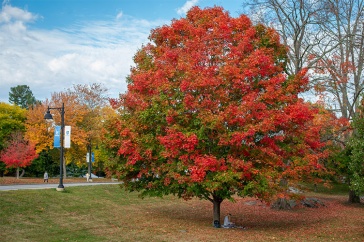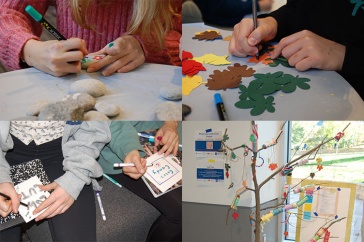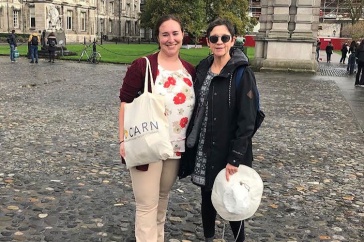
During the 2016-2017 academic year, I was fortunate enough to enjoy a position as Fellow-in-Residence at the Edmond J. Safra Center for Ethics at Harvard University. The Center is one of the preeminent multidisciplinary institutions for rigorous and sustained scholarly work at the intersection of ethics and public/professional life. Emerging from its previous formulation as the Program in Ethics and the Professions, the Center began its life as then Harvard president Derek Bok recognized that many departments and programs within the university were engaged in persistent and powerful questions about moral/ethical obligations/duties/responsibilities in professional and public contexts. In short, as ‘good’ research was produced, questions of how to identify ‘the good’ applications of those works were ongoing in parallel yet discrete venues, with little systematized impact on students. The Program that would grow into the Center was established in 1986 as a central location in which faculty might come together to focus divergent disciplinary work on those ethical questions. Today, in support of that fine legacy, the Center is led by accomplished multidisciplinary scholar Danielle Allen and its Fellow-in-Residence Program greatly expands the catchment area of the Center’s constituency, bringing together an international array of scholars across academic traditions in the service of attending to shared problems and pursuits related to how we ought to live with and amongst others.
As a normative philosopher of education, I am well attuned to the degree to which discussions of ethics might seem marginalized within the conceptual frameworks that have begun to dominate educational institutions/discourses. Though ethical considerations surely pepper all corners of that landscape, it was refreshing to devote myself to a year of study in an environment unambiguously earmarked for such activities. As the only Fellow-in-Residence formally working on education last year, I benefitted from conversations that stretched my thinking on familiar topics and brought new views into sharp focus.
More specifically, during my time at the center, I worked on strengthening the necessary foundations of a large scholarly undertaking on the relationship between politics and education; this has been a complex project that I’ve been pursuing in piecemeal for a number of years. Under my reading of the trends in educational research, mainstream analyses presume the relationship between politics and education to be rather limited (in my work, I label this the ‘narrow view’). For example, investigations into justice in education often proceed as though educational activities are interesting primarily for their instrumental role in realizing larger social and political goals. Under this view, the pursuit of justice in education might mean ensuring that educational resources are properly distributed as social or political goods, or that education is arranged so as to create free and equal political citizens. In short, political conceptions of justice direct the normative features of educational research and focus on a merely functional view of education (i.e., as participating in the task of distributing sociopolitical/economic burdens and benefits upon persons). My ongoing project argues that the narrow view of the relationship between education and politics not only cheapens our sense of justice in education, but also imperils our understanding of the political essence of justice in public life within a pluralistic society. By adopting a ‘wide view’ of the range of this relationship and asking what is owed to persons and polities as a matter of educational rather than political justice, my project traces a history of a number of the dominant ideas in education and identifies their obscured dimensions towards articulating a renewed approach to the core of democracy. In short, I showcase a conceptual terrain that might allow for educational aims to justifiably direct political processes.
During my time at the Center I was glad to engage in rich conversations with others (including, inter alia, political theorists, sociologists, classicists, journalists, and philosophers). United by the timeless, yet so very timely, working theme of ‘Diversity, Justice, and Democracy’ (the Center’s 2016-2017 theme), the community of Fellows and other persons affiliated with the Center transformed elements of my thinking about my work. Though we often shared a conceptual language and (a good many) values, our work was distinct enough that we were able to offer productive comments while pointing one another toward novel resources. Through the Center’s formal recurring events (Fellows' seminars, Public Lectures, the Ethics in Your World series, Ethics Mondays, and more) and the informal conversations that followed, I found myself inhabiting an incredibly generative intellectual environment.
Given these opportunities, I was able to restructure the form of my comprehensive arguments and forestall the potential criticisms that my project implies a perfectionist account of human flourishing (be it Aristotelian or otherwise) or relies too heavily upon the intuitions of Martha Nussbaum’s or Amartya Sen’s version of the Capability/ies Approach to human development. Having attended to these and related aspects of the project, I have come to better appreciate the potential of the work and benefitted from presenting subordinate material (at Harvard and beyond) on the pedagogical dimensions of race-based protest movements, political and pedagogical tensions of academic freedom and safe spaces on university campuses, and the potential shared core of civic and epistemic virtues. During my fellowship year, I have had 6 articles or book chapters accepted or published – with a good many more initiated by the excitement of my experiences.
Though the year away was rewarding (most importantly, I became a new parent during this period!), I have been glad to return to the good community of my intellectual home in Morrill Hall. As exciting as my fellowship year was, I am equally excited to imagine how I might marshal those experiences in the service of forwarding the good work of Education at UNH.


















































